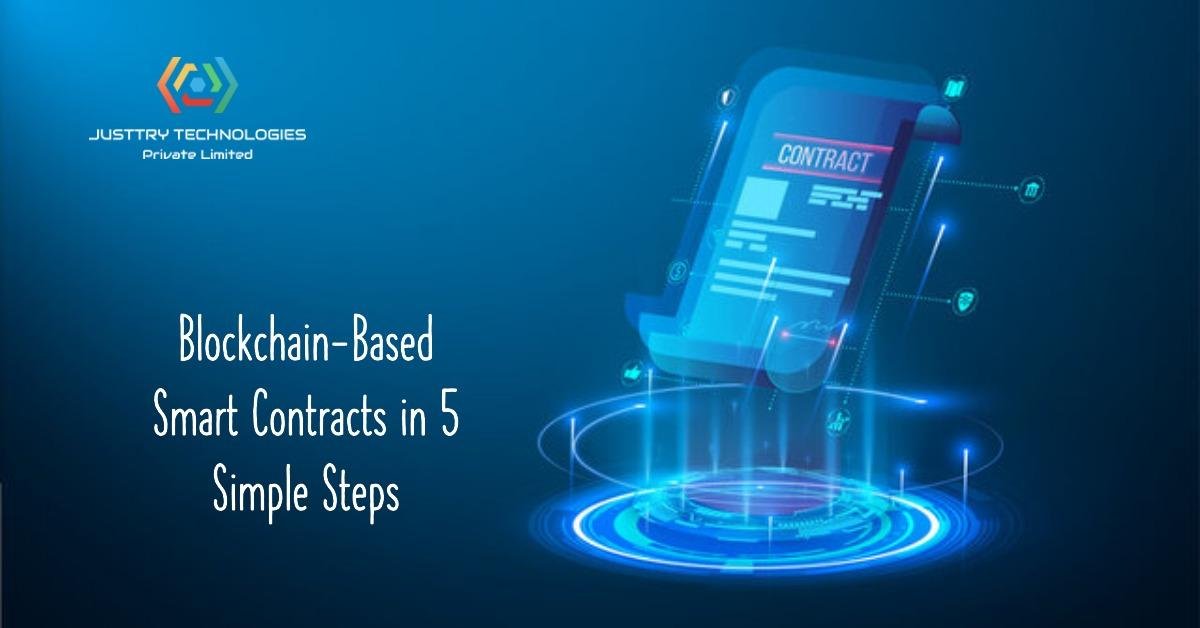-
Ροή Δημοσιεύσεων
- ΑΝΑΚΆΛΥΨΕ
-
Blogs
Build Your Blockchain-Based Smart Contracts in 5 Simple Steps

Introduction
The digital renaissance is in full swing, driven by decentralized technologies that are rewriting the rules of engagement. At the heart of this transformation lies the smart contract, a self-executing agreement powered by blockchain. In a Web3 smart contracts-dominated economy, the ability to build your smart contract development services isn’t just an advantage; it’s a strategic imperative.
What is a Smart Contract
A smart contract is a programmable agreement that autonomously executes when predefined conditions are met. Stored on a blockchain, it eliminates intermediaries, reduces costs, and enhances trust.
-
Autonomy – Once deployed, it runs without intervention.
-
Immutability – Tamper-proof logic that resists manipulation.
-
Transparency – Open for public verification, ensuring fairness.
By replacing human error and inefficiency with code, smart contracts are transforming industries from finance to real estate.
Smart Contract Architecture
Architecture defines destiny even in code. Meticulous planning ensures resilience and clarity.
-
Define the core purpose: What will the contract do?
-
Set event triggers: Specify when the contract activates functions.
-
Build condition logic: Create if-then pathways for execution.
-
Prioritize security: Incorporate fail-safes, fallback functions, and access control.
Designing with foresight reduces post-deployment vulnerabilities and simplifies future upgrades.
Step-by-Step Guide to Building Your Smart Contract
1. Define the Use Case
Start by clearly identifying the real-world problem your blockchain-based smart contract is designed to solve. This foundational step influences every decision going forward, from architecture to execution. Common use cases include:
-
Automating token swaps for decentralized exchanges
-
Managing royalty distributions for digital assets like NFTs
-
Enabling decentralized lending or borrowing through DeFi protocols
A well-defined use case ensures the contract's logic is purpose-driven, secure, and scalable.
2. Select a Blockchain and Development Tools
Choose a blockchain ecosystem aligned with your goals. Ethereum remains the most popular choice for smart contracts, but others like Solana, Polygon, and Avalanche offer unique advantages (e.g., speed, lower gas fees).
Set up your development environment with the right tools:
-
Truffle or Hardhat – For local Ethereum development and deployment workflows
-
Remix IDE – A browser-based IDE ideal for writing and testing Solidity contracts quickly
-
Ganache – A local blockchain simulator to test transactions and interactions before going live
3. Write the Smart Contract Code
Develop your smart contract logic using Solidity (for Ethereum-compatible chains) or Rust (for Solana and others). Your code should follow best practices in modularity, readability, and security.
Key components to include:
-
State variables to track ownership, balances, timestamps, etc.
-
Events for logging key interactions and enabling off-chain integrations
-
Modifiers for access control and validation (e.g., onlyOwner, nonReentrant)
-
Core functions like transfer(), mint(), burn(), stake(), or withdraw(), depending on your use case
Use comments and structured code to improve maintainability.
4. Test in a Controlled Environment
Testing is non-negotiable. Use frameworks like Chai/Mocha (JavaScript testing libraries), Hardhat’s testing suite, or Truffle’s built-in testing tools.
Focus on:
-
Edge case testing to validate logic across unexpected conditions
-
Security testing to detect reentrancy, integer underflow/overflow, and access control violations
-
Gas efficiency to optimize performance and reduce deployment costs
Run both unit tests and integration tests across different scenarios before proceeding.
5. Deploy and Monitor
Once tested, deploy the smart contract to a testnet (e.g., Goerli, Mumbai) for final validation in a near-live environment. Use deployment tools or scripts via Truffle, Hardhat, or Remix.
After deployment:
-
Monitor interactions using Etherscan, Polygonscan, or Solana Explorer
-
Track performance, transaction logs, and anomalies with tools like Tenderly, Alchemy, or Infura
-
Consider implementing upgradable contracts via OpenZeppelin’s proxy patterns if future changes are anticipated
Always follow up with ongoing audits, version control, and documentation to ensure transparency and longevity.
Real-World Applications of Smart Contracts
Smart contracts are reshaping industries. Some key areas include:
-
DeFi – Powering lending platforms, decentralized exchanges, and yield protocols
-
NFTs – Automating royalties, minting, and marketplace mechanics
-
Supply Chain – Real-time logistics and anti-counterfeit tracking
-
Identity – Verifiable credentials, KYC automation
From art to agriculture, their versatility is remarkable.
Why choose our Professional service?
Building an advanced and efficient smart contract often requires specialized expertise. That’s where smart contracts from experienced professionals become invaluable.
Partnering with a trusted smart contract development company, like Justtry Technologies, ensures:
-
Bulletproof architecture and code
-
Integration with complex dApps
-
DeFi smart contract development for high-risk, high-value ecosystems
-
End-to-end lifecycle support, from planning to audit
For startups and enterprises alike, this partnership is a catalyst for success.
Final Thoughts
As Web3 races past its infancy, smart contracts are poised to leap from rigid, single‑chain scripts to living, composable engines that coordinate value and data across multiple networks in real time.
Imagine contracts that tap AI for autonomous decision‑making, safeguard sensitive computations with zero‑knowledge proofs, and fluidly bridge liquidity from Ethereum to Solana in a single execution flow.
That future is already taking shape, and the only question left is this: Will you be the builder who turns tomorrow’s decentralized economy into today’s reality?





